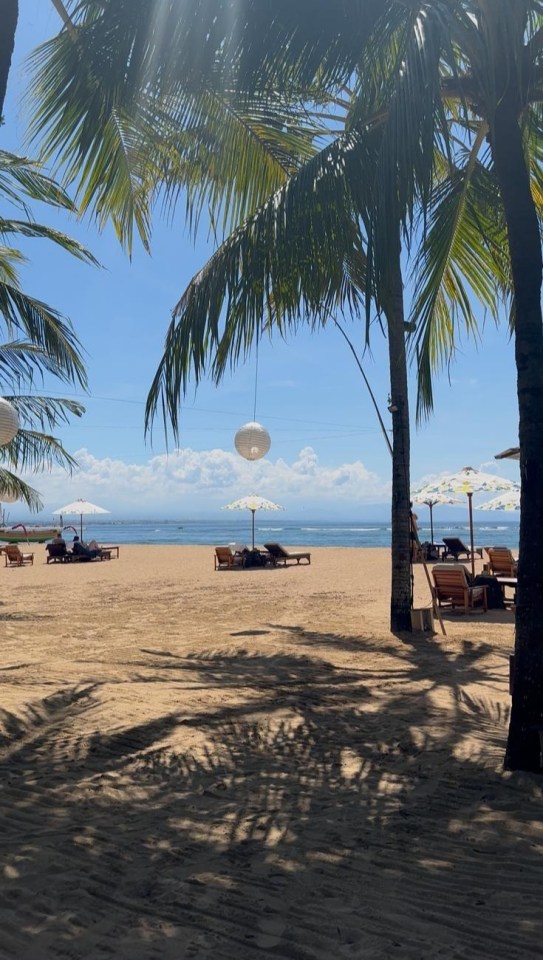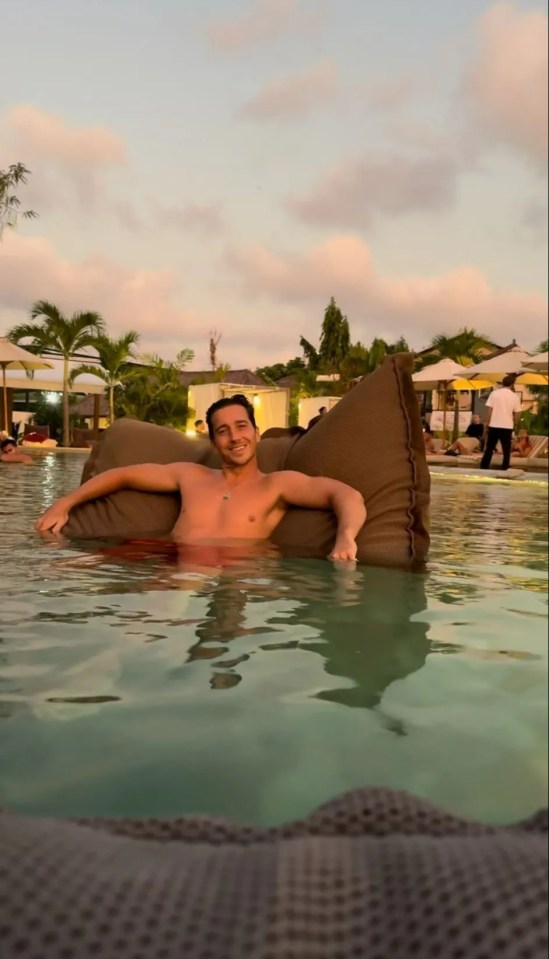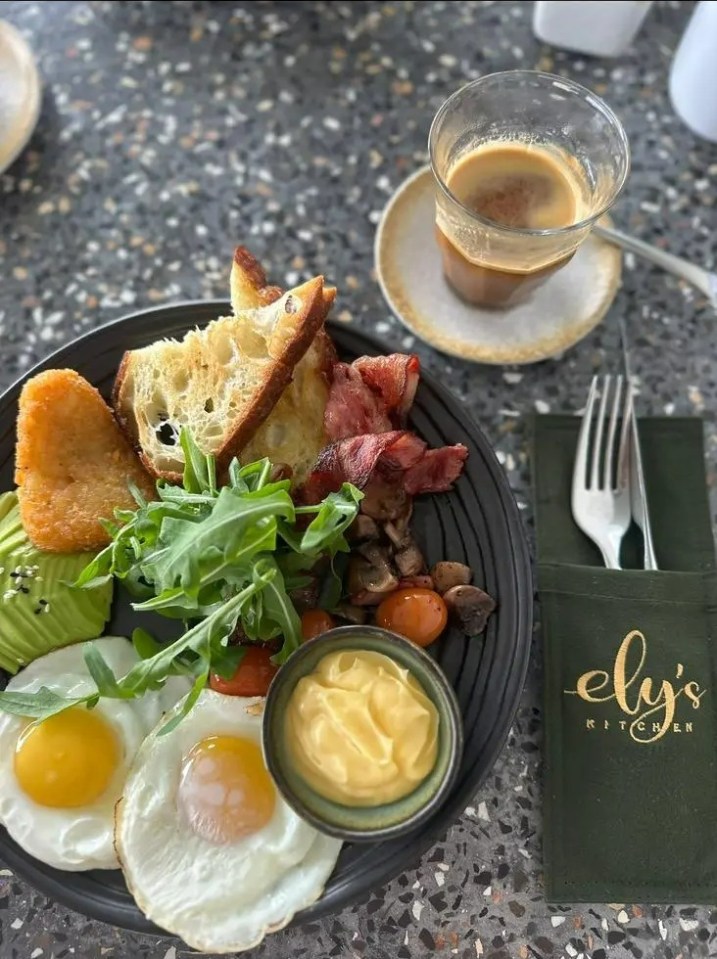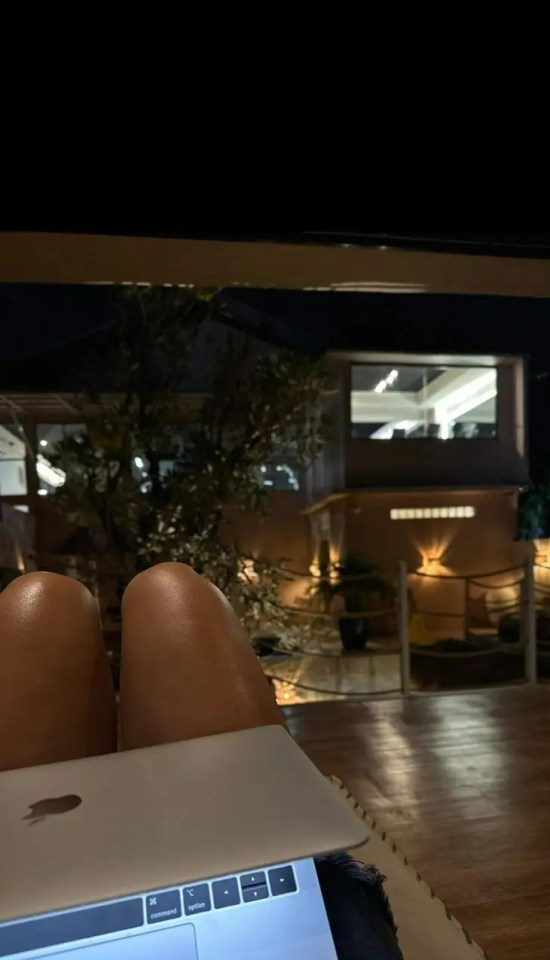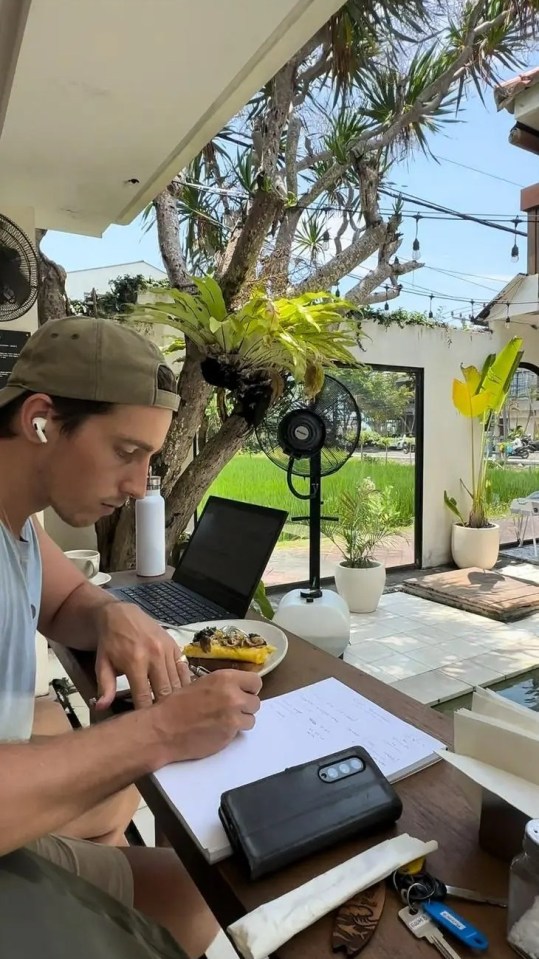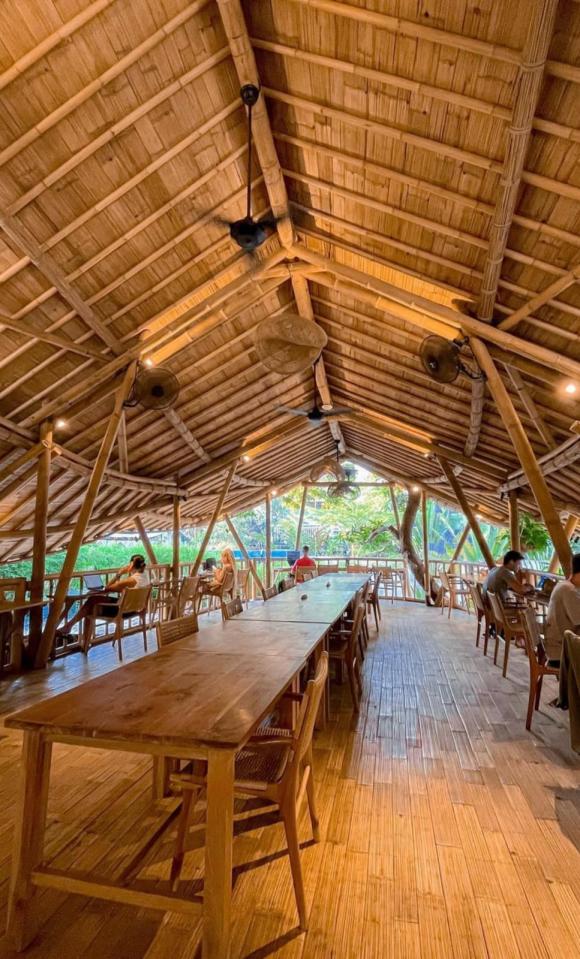SITTING at her desk, Harriet Sharpley-Fanner, 30, no longer stares out of the window at miserable weather and towering city office blocks.
Instead, her office overlooks a designer swimming pool and tropical gardens and a waiter hovers attentively to bring a latte and fruit platter as a mid-afternoon snack.
This is Harriet’s ‘workplace’ since she and her partner bailed out of Britain to begin a new life on the Indonesian island of Bali where rent is an eighth of the price she once paid in London.
Dinner, delivered to her door, costs just £2.20 and Harriet has the choice of offices with views overlooking the beach, the jungle or exotic swimming pools – all for less than a fiver a day.
The island paradise of Bali has been rated by the Post Office Money Holiday Report as the fourth most popular holiday destination for Brits wanting value for money.
Not only that, the cost of living in Indonesia is cheaper than in 93 per cent of countries in the world.
Now figures revealed more British than ever before are choosing to bail out to Bali trading the United Kingdoms’ rising cost of living and uncertain future for the sun, surf and chilled lifestyle offered by the Island of the Gods.
The expat-run Living in Indonesia website reveals in 2015 there were 4,000 Brits living in the country and by 2020 that figure had risen to a staggering 32,911.
Harriet, a former fine jewellery staffer, moved from Reigate, Surrey with her partner Harry Todman, a business consultant, to the village of Canggu on the southern tip of the Indonesian island in September last year.
Talking exclusively to The Sun, Harriet revealed: “We rent a one-bedroom cottage with a shared garden a few blocks away from the main street of the village for £225 a month. It includes all the electricity, air conditioning and furniture including two fridge freezers, and dining table.
“In Reigate, we were paying £1,300 for a one-bedroom flat and before that we paid £2,800 a month in Holland Park, and that didn’t include bills.
“Now we’re a short walk to a stunning beach, with amazing local restaurants offering exotic dinners for two quid and a bike ride takes us into the tropical forest.
“We moved to Reigate from London to save money and now we’ve moved halfway around the world for even cheaper rent, an amazing lifestyle, a healthier life and new careers.
“The first month we worried we’d spend all our savings because converting pounds to the Indonesian Rupiah is stressful. One British pound gets you 22,471 rupiah. It took us a moment to understand 1 million rupiah was £44.”
Whirlwind decision
Harriet says the decision to flee Britain and move to a country she’d never visited before was made in the space of 48 hours last July.
“Harry and I had returned from a holiday in Spain,” she says. “Harry was offered voluntary redundancy because his job was to make the company more efficient – and he was too good at his job.
“We jokingly said maybe we should move to Bali.
“It was the 8th of the month and if we were going to give notice on our flat, we had to do it by the 11th. We sat up and talked and decided we were sick of the cost-of-living crisis and wanted more from life.
“It’s the best decision we’ve ever made. Within two months of being in Bali we felt we’d found our ‘forever home’.
“We never stop being amazed at how cheap it is to eat out, how trips to Aldi and Sainsbury’s are a distant memory and how battling the Tube is no longer part of our daily life.
“The cost of living is so cheap I eat out for lunch and dinner every day.
“Everything except branded clothing and groceries from ‘tourist supermarkets’ is cheaper.
“I feel inspired again for the first time in almost twelve years. There is a calmness and joy you don’t experience in Britain.
“For the first time in a decade, I feel I have a positive future. The stress and anxiety I felt in Britain has gone. We have personal time and work time and it’s great.”
‘Milestone’
Harriet grew up in Salisbury, Wiltshire and, from sixteen, developed a passion for jewellery design before studying diamond grading at the Gemological Association of Great Britain.
She spent the next decade working in the luxury fine jewellery design sector in London.
“I worked on necklaces, rings and bracelets worth millions of pounds. It included holding a diamond worth a staggering £42 million.”
Harriet was working as a jewellery boutique manager when she and Harry, 33, decided to start afresh.
“Turning 30 is a milestone and many friends are marrying, buying homes, or having children.
“Harry and I often talked about moving overseas and started reading up on the rise of digital nomad visas which opened long stays in many countries.”
When the cost-of-living crisis hit Harriet says she began feeling overwhelmed with working to live.
Like many people around Britain the pair admit, after rent and bills were paid, putting money aside for savings was getting harder and harder.
“I think when you have a career and hit 30 you expect things to become a little easier but rising prices meant the dreams we had seemed almost unreachable.
“I was reading about more people my age fleeing Britain and setting up their own businesses in Asia or Europe.”
“After Harry accepted the redundancy package, we decided to take a massive leap of faith and bail out for Bali.”
The pair’s friends and family were shocked.
“People thought we were bonkers. Others couldn’t fathom why we’d choose a country we’d never even holidayed in,” she says.
“To many people Bali is a two-week holiday, not a lifestyle choice.
“Some thought it was a prank. Others tried to change our minds. For us, doing it together was important. We could support each other.
“It was scary especially when we started selling everything, from furniture to clothes and even toasters and microwaves to help pay for our Bali bailout.”
Nomad living
Harriet and Harry are not the only thirty-something’s choosing to leave Blighty behind, attracted by new ‘nomad visas’, launched in over 50 countries worldwide.
A British Council survey shows 72 per cent of 18 to 30-year-olds are considering living abroad in the long term and 11 per cent are moving now.
More than half of people under 35 believe their standard of living is worse than it was for their parents’ generation and they are struggling with low wages.
Relocations to Indonesia have soared by a staggering 156 per cent, driven by the introduction of the E33G Remote Worker Visa, also known as KITAS, which permits remote work from within Indonesia for up to 12 months.
“We feel Britain is dying and no one wants to stay. It’s not just the warm weather and adventure but cheaper living costs and the ability to work from the beach,” says Harriet.
“We researched expat communities and discovered the village of Canggu was a place that catered for digital nomads and long stay expats.”
The first month the couple stayed in a village guest house, a cottage style complex with rooms and a restaurant.
“It allowed us to relax a little, breathe and start making connections.
“Looking back, we made the decision to leave Britain in two days. It’s been a whirlwind since then of giving notice on leases, selling up, saying goodbye and booking flights.
“People talk about moving and spend time dreaming. Just do it – we did it and put ourselves on a deadline.”
“I often think that this monumental life change happened in the blink of an eye. I have waited longer for a GP appointment than the time it took us to move from Britain to Bali.”
She explains: “I’d spent a decade focused on my jewellery career and I’d achieved many of my goals.
“Leaving the safety of that behind was easy. I knew I’d suffer burn out if I didn’t. I needed to discover what else is out there. That takes guts.”
Once Harriet and her partner arrived in Bali they joined local Facebook groups for expats and digital nomads.
“These groups are for people staying in Bali, Brits helping Brits. That’s essential when you move to another country.”
The couple had a little over £10k in savings to pay for tickets, accommodations and setting themselves up in Bali.
Through word of mouth the couple found their one-bedroom cottage with shared garden, which includes the cost of water, electricity, and Wi-Fi, for £225 a month.
“We even adopted a cat from the lady who was giving up her lease. Knowing all the bills were included as a huge relief.”
The cottage complex doesn’t include a pool, so the couple pay £120 a month for membership at a gym, spa, pool and restaurants complex.
“It has plunge pools, a gym, tennis courts, ice baths, swimming pools, saunas, hot tubs, amazing gardens and restaurants as well as massages and beauty treatments under one roof.
“It’s popular with other expats and a place to relax, network and be a home away from home. “When you are by the pool each sunbed has a button you press, and someone takes your food or drink order. The food and drink prices are incredibly cheap.”
Harriet admits she wanted a career break for jewellery design and took on an appointment setter role for an international firm operating in Bali.
“It’s a popular job for many people who move to Bali. You make up to £1000 a month setting up interviews for a range of international firms to meet clients or follow up queries they receive online.
“I am also working on social media management skills and plan on setting up my own business in the coming months.”
Harry runs his own online internal conflict coaching business and has clients all over the world.
Beer for £1.50
The couple don’t work in a standard British style office environment; instead they are joining the hundreds of other Brits in Bali working from co-working cafes.
“These are cafe style workspaces which have a desk or table with a power supply, charger, free Wi-Fi, meeting spaces designed for people to ‘work from home.’
“Instead of gloomy offices you work in an open Asian style airy space which overlooks a pool, is surrounded by lush tropical plants, has verandas and is buzzing with people of all ages from all countries. It’s a relaxed atmosphere where people offer each other help.”
“They are stunning open restaurants and workspaces which blow my mind.
“You only have to pay £1.50 which is the cost of a coffee and snack to use the space. Most people stay all day. The food is brilliant. Lunch costs £2 for delicious stir fries, fruit platters, vegetable platters, curries, and soups.
“We start work at around 8:30am while other people start work at midday or 3pm because they’re working from USA time to Australian time.”
Harriet can choose different co-working cafes with some by the ocean, others overlooking jungle scenes and some have pools for a lunchtime swim.
The couple eat lunch and dinner out or have it delivered by an uber style service called ‘Grab.’
You can order anything from burgers and fries, to Nasi goreng and sushi, delivered to your door for £2.50.
“When I think we’d spend £40 on a Chinese takeaway back home I have to pinch myself I am not on a different planet.”
Harriet says prices can vary because some supermarkets are designed for expats and cheaper options are available in village markets.
Local cheese is £5.49 a kilo, imported cheese is more than £10 for 250 grams.
Rice is around 65p a kilo, a white loaf 85p, chicken costs £2.38 a kilo and beef is £6 a kilo depending on the cut. Milk will cost 92p a litre and Harriet says Bali offers more alternative milk options than London.
“I eat dairy free and was worried I couldn’t get food in Bali for my diet but it’s brilliant. An oat milk latte costs around £2 when you consider an oat milk coffee at Costa or Starbucks is more than £4.”
Imported beer is £2.23 a litre and local beers £1.50 a litre and if you smoke, a packet of Marlboro costs £1.78.
Hailing a cab in Canggu costs 44p and the early kilometre is 22p.
Harriet and Harry lease a N-Max Moped and pay £61 a month and petrol is 58p a litre.
“If we break down within thirty minutes a new bike is provided, no questions asked. It’s roadside service but at a level we never experienced in Britain.”
Since being in Canggu Harriet has met many British families who have moved to Bali not just for the Asian lifestyle but the world-renowned Green School
The international school is set amongst jungle and rice fields, and the classrooms don’t have walls, there are no grades, the children feel no pressure and instead learn at their own rate.
It boasts 500 students from 50 countries who study in a bamboo-crafted space shaped building. The school’s focus is sustainability, eco-entrepreneurship, and mindfulness.
Parents from Britain are now queuing up to send their children here where fees range from £5,929 annually for kindergarten up to £15,187 for sixth form.
“I was shocked when I learnt about the cutting edge education provided for children in Bali at the school,” says Harriet.
If you prefer the more standard school structure, preschool costs £75 a month per child and the international primary school is £4,500 a year per child.
Harriet says health care in Bali is better than Britain’s.
“I suffered a severe case of Bali Belly on day two here and was terrified.
“A friend recommended a medical service and within an hour of calling I had a doctor and nurse with an IV and fluids, antibiotics, testing kits and medication at my hotel for £75. And that included checkups the next day.”
Harry recently had two fillings and a root canal done. It cost him £22 per filling – a fraction of the price it would have cost Britain if you didn’t have an NHS dentist.
There are Zara and H+M stores in Bali and the prices are equivalent to the London high street.
A pair of Levi jeans cost £30 and a pair of Nike running shoes £50.
“I only packed basic travel clothes and as a size 10-12 find it hard to buy clothes that fit at a local village market.
“You can get dresses and outfits tailored but it does cost.”
Harriet does admit being single in Bali can be tough.
“I have single friends who say finding Mr Right or Miss Right is almost impossible.
“You are never short of dates if you are single, but long-term romance is much harder to find.”
Harry and Harriet have spent their days off exploring Bali and recently stayed at a friend’s luxury villa.
“They leased the villa with its three bedrooms, four bathrooms and pool in a luxury location for £1000 a month. The view is spectacular but to get that price they paid a year’s lease up front.”
If you want to buy property in Bali, you need to ensure it’s allowed under your visa.
“A four-bedroom house with three bathrooms, two living rooms, an office, outdoor entertaining space, a pool, and additional land with jungle or ocean view for the family is around £300k.
Harriet says she is more relaxed, less stressed, and happier than she has ever been.
“I have taken a break from jewellery design but now feel re-inspired by my new way of life and in my down time love visiting local jewellers and learning about the style and craft.
“The Balinese are amazing with children and many people we have met are planning on staying and raising families.
“For us we have a chance to breathe again. We’re not just working to pay bills, we are working to live.
“We bailed out of Britain for Bali but it’s the chance to breathe and be our best selves. Something I never thought I’d experience.”





